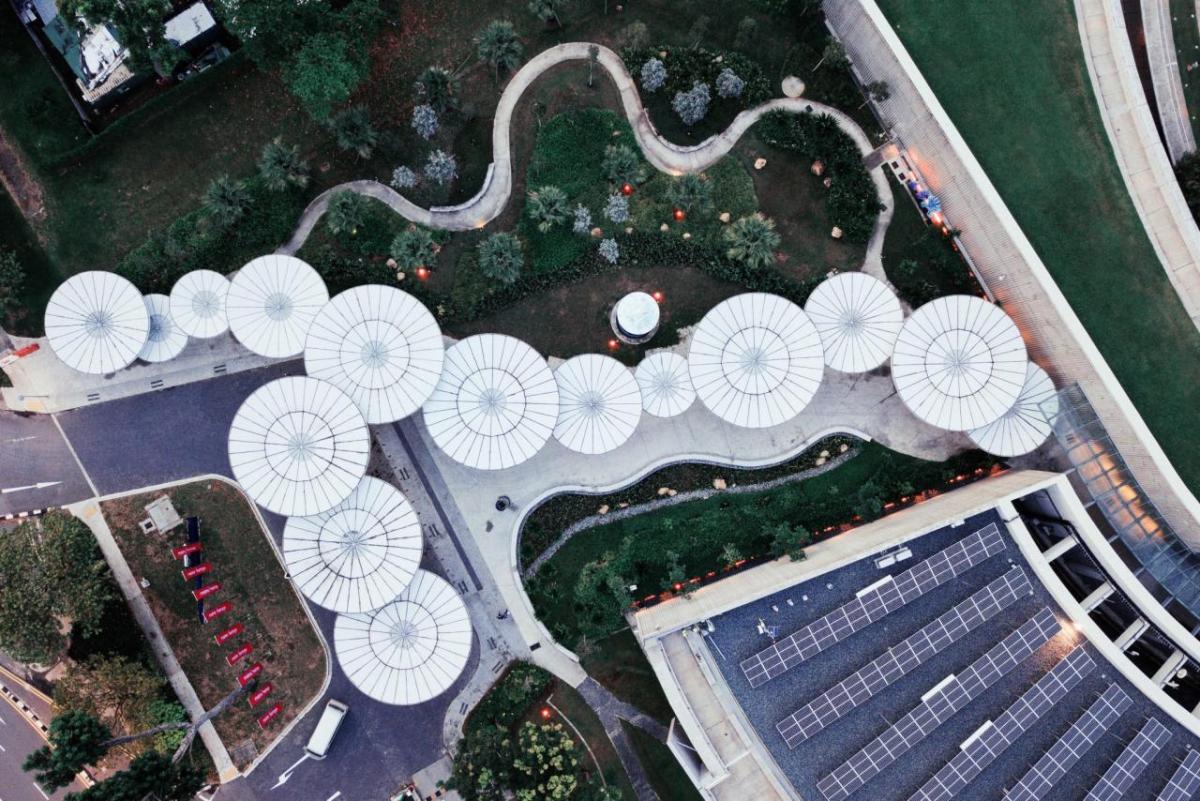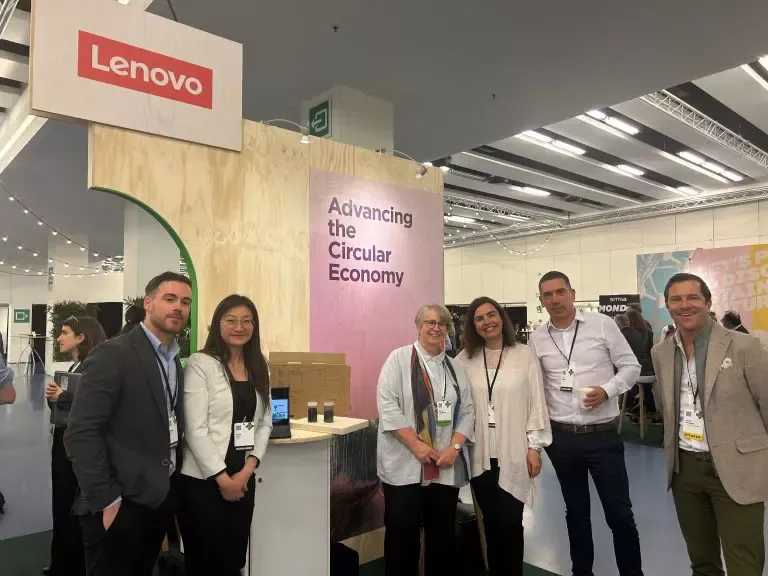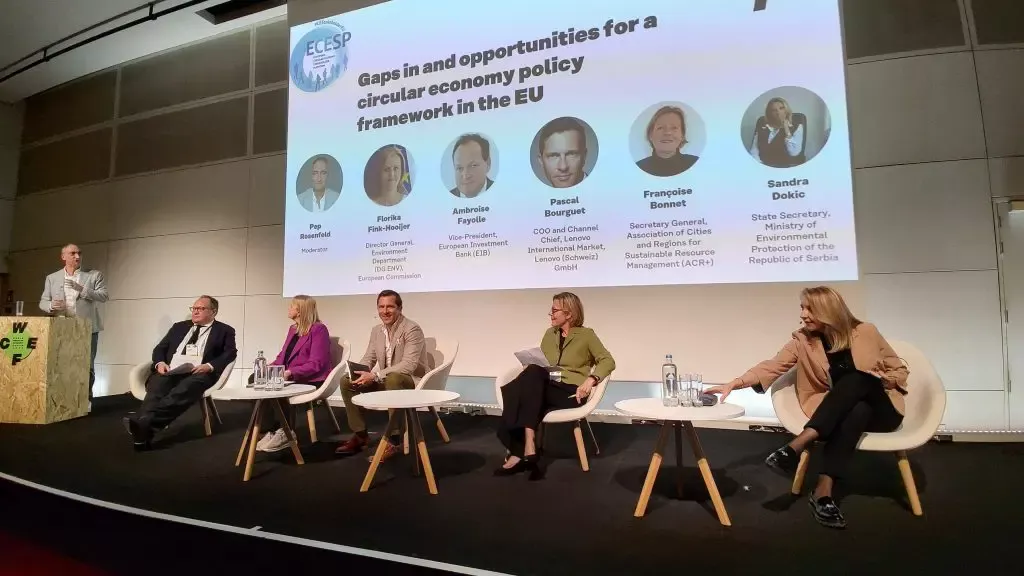Lenovo Showcases Circularity at World Circular Economy Forum 2024
Lenovo returned to this year’s World Circular Economy Forum (WCEF) in Brussels, Belgium, showcasing its commitments to the circular economy and its position as a committed, long-term player in the space. WCEF is a global event focused on advancing circular economy practices. Under the theme “Turning circular visions into actions”, the event gathered stakeholders from the business and political worlds to discuss sustainable, innovative, and bold solutions to face the urgency of embracing a circular economyapproach in all industries. and share innovative ideas.
For Lenovo, WCEF was a great opportunity to talk about its transition to a circular economy through innovations in its supply chain, product design, services, and business models. With its latest innovations in product design and packaging, Lenovo is at the forefront of circularity. Lenovo integrates recycled content into more than 298 product lines. In collaboration with Toray and Boeing, the ThinkPad X1 Carbon Gen 12 includes recycled carbon fiber material made from aircraft manufacturing by-products.
Lenovo is also innovating to increase sustainable packaging in products, and has adopted more sustainable materials like sugar cane and bamboo in select product packaging, enabling a transition away from Styrofoam and plastic. By FY2025/26, Lenovo aims for 90% of PC product’s plastic packaging to be made from recycled materials, and plastic-free primary packaging will be expanded. Lenovo’s infrastructure solutions group has also reduced cardboard packaging consumption by 105 pounds per rack through rack integration shipping methods.
Furthermore, repairability is a key driver for the circular economy and Lenovo has been proactively empowering self-repair for its commercial laptops as shown with its recent partnership with iFixit for the Lenovo ThinkPad T14 Gen 5 and T16 Gen 3; achieving a provisional iFixit repairability score of 9.3 out of 10. By FY2025/26, Lenovo aims for 84% of repairs to be completed at the customer site, without having to send the PC to a service center (excluding Android tablets and visuals), a step that should increase speed of repairability.
In addition to internal commitments, Lenovo is also helping its customers in their own sustainability journey and contributions to the circular economy, enabling reuse or responsible disposal of assets with end-to-end Lenovo services. Lenovo Asset Recovery Services (ARS) helps mitigate end-of-life IT and data security risks and promotes the reuse of parts wherever possible. With Lenovo Certified Refurbished, customers can give their devices a new lease on life. Lenovo PCs are refurbished, repaired, and certified to the highest quality standards — helping customers realize cost savings and increased sustainability for their IT fleet.
Collaboration is key in accelerating turning circular economy from vision to actions. “Collaboration across the value chain is critical”, said Pascal Bourguet, Global Channel Chief & COO, Lenovo International Sales Organisation. “We will continue to incorporate circularity into every aspect of our business – from designing our products or services, to partnering with suppliers to develop innovative new applications for recovered materials. We will engage with governments and standards bodies to establish the right frameworks and incentives to promote circular activities.” As a community, the Lenovo 360 Circle leads the way in collaborating with Lenovo’s ecosystem to drive action in the circular economy and support business partners in their own sustainable transformation, promoting circular economy from design to use, return, reuse, and disposal.
Lenovo’s participation in the WCEF was also an occasion to network with peers, European government officials, policymakers, and UN Institutions about the future of circular economy in Europe and globally. The implementation and governance of regulations will be critical to an equal playing field, with input from all stakeholders to sustain lasting progress. Global alignment of the definitions and enforcement of quality standard will be key to build trust in refurbished devices. The collaboration between the private and the public sectors must be considered as a key enabler to a faster implementation of circular economy principles in the tech industry. and Lenovo is committed to enhancing its influence and supporting its ecosystem in this journey.
Furthermore, in addition to the main WCEF event, Lenovo joined two WCEF Accelerator sessions: “Platform-driven transition: scaling circular solutions” and “Empowering the circular economy: integrating AI, digital transformation, and skills development” organizedin collaboration with Microsoft. It represented other opportunities for Lenovo to join the conversation and demonstrate its commitment and concrete actions for circular economy in the tech industry.
Read more about Lenovo’s efforts to create a smarter, more sustainable future for all in the company’s FY 2022/23 ESG Report.




